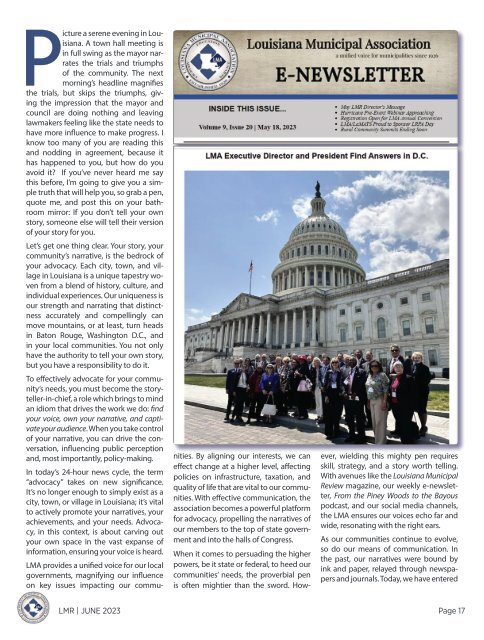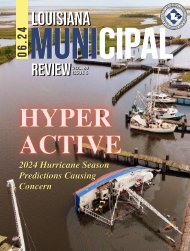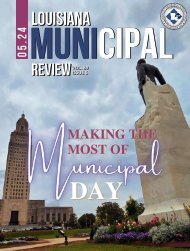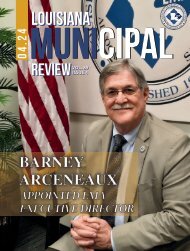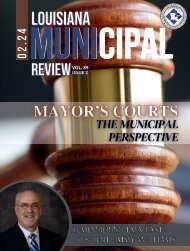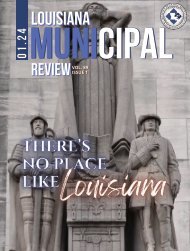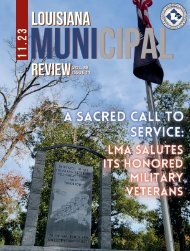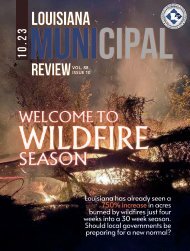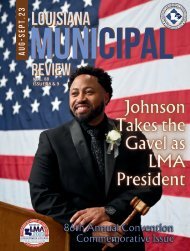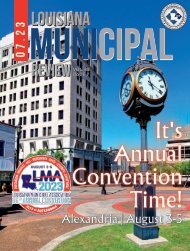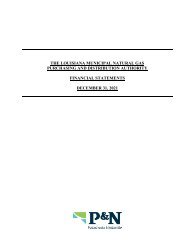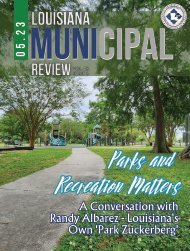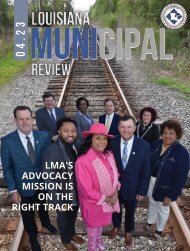LMR June 2023 FINAL
Create successful ePaper yourself
Turn your PDF publications into a flip-book with our unique Google optimized e-Paper software.
Picture a serene evening in Louisiana.<br />
A town hall meeting is<br />
in full swing as the mayor narrates<br />
the trials and triumphs<br />
of the community. The next<br />
morning’s headline magnifies<br />
the trials, but skips the triumphs, giving<br />
the impression that the mayor and<br />
council are doing nothing and leaving<br />
lawmakers feeling like the state needs to<br />
have more influence to make progress. I<br />
know too many of you are reading this<br />
and nodding in agreement, because it<br />
has happened to you, but how do you<br />
avoid it? If you’ve never heard me say<br />
this before, I’m going to give you a simple<br />
truth that will help you, so grab a pen,<br />
quote me, and post this on your bathroom<br />
mirror: If you don’t tell your own<br />
story, someone else will tell their version<br />
of your story for you.<br />
Let’s get one thing clear. Your story, your<br />
community’s narrative, is the bedrock of<br />
your advocacy. Each city, town, and village<br />
in Louisiana is a unique tapestry woven<br />
from a blend of history, culture, and<br />
individual experiences. Our uniqueness is<br />
our strength and narrating that distinctness<br />
accurately and compellingly can<br />
move mountains, or at least, turn heads<br />
in Baton Rouge, Washington D.C., and<br />
in your local communities. You not only<br />
have the authority to tell your own story,<br />
but you have a responsibility to do it.<br />
To effectively advocate for your community’s<br />
needs, you must become the storyteller-in-chief,<br />
a role which brings to mind<br />
an idiom that drives the work we do: find<br />
your voice, own your narrative, and captivate<br />
your audience. When you take control<br />
of your narrative, you can drive the conversation,<br />
influencing public perception<br />
and, most importantly, policy-making.<br />
In today’s 24-hour news cycle, the term<br />
“advocacy” takes on new significance.<br />
It’s no longer enough to simply exist as a<br />
city, town, or village in Louisiana; it’s vital<br />
to actively promote your narratives, your<br />
achievements, and your needs. Advocacy,<br />
in this context, is about carving out<br />
your own space in the vast expanse of<br />
information, ensuring your voice is heard.<br />
LMA provides a unified voice for our local<br />
governments, magnifying our influence<br />
on key issues impacting our communities.<br />
By aligning our interests, we can<br />
effect change at a higher level, affecting<br />
policies on infrastructure, taxation, and<br />
quality of life that are vital to our communities.<br />
With effective communication, the<br />
association becomes a powerful platform<br />
for advocacy, propelling the narratives of<br />
our members to the top of state government<br />
and into the halls of Congress.<br />
When it comes to persuading the higher<br />
powers, be it state or federal, to heed our<br />
communities’ needs, the proverbial pen<br />
is often mightier than the sword. However,<br />
wielding this mighty pen requires<br />
skill, strategy, and a story worth telling.<br />
With avenues like the Louisiana Municipal<br />
Review magazine, our weekly e-newsletter,<br />
From the Piney Woods to the Bayous<br />
podcast, and our social media channels,<br />
the LMA ensures our voices echo far and<br />
wide, resonating with the right ears.<br />
As our communities continue to evolve,<br />
so do our means of communication. In<br />
the past, our narratives were bound by<br />
ink and paper, relayed through newspapers<br />
and journals. Today, we have entered<br />
<strong>LMR</strong> | JUNE <strong>2023</strong> Page 17


